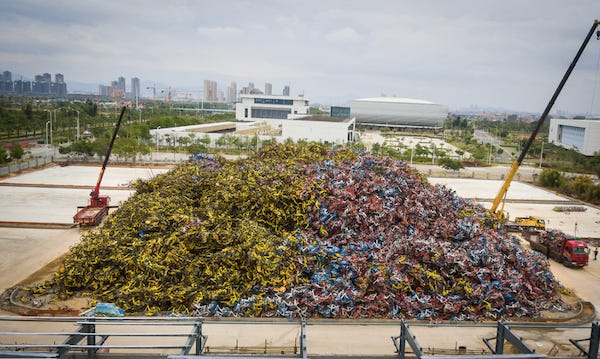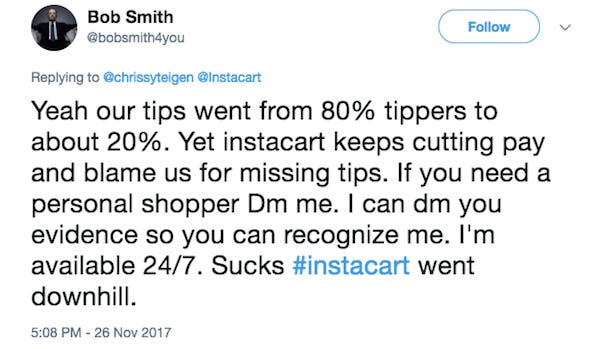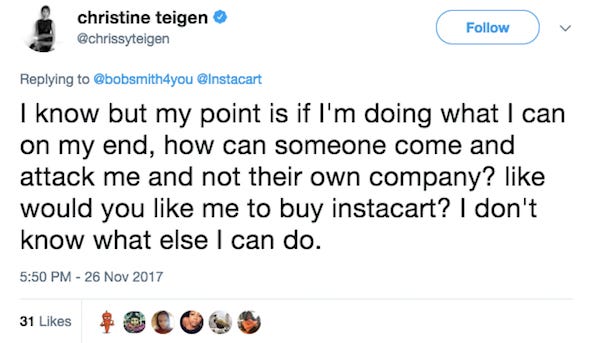Uber operated covert intelligence unit, Lyft cuts losses, China's bike-share graveyards
LXXXV
Hello and welcome to Oversharing, a newsletter about the proverbial sharing economy.
If you’re returning from last week, thanks! If you’re new, nice to have you! (Over)share the love and tell your friends to sign up here. Yesterday was National Cookie Day, and I think we should all take a brief moment of silence for the Sugar Shack Cookie, which would have been two-and-a-half years old. This is issue eighty-five, published December 5, 2017.
Marketplace Analytics.
I am not a lawyer, but it strikes me there are some things you never want a judge to say to you in court. For instance:
I can no longer trust the word of the lawyers in this case.
I can't trust anything you say because it's been proven wrong so many times.
Any company that would set up such a surreptitious system, it just is as suspicious as can be. When the whole point is to—to avoid leaving a, quote, paper trail. I don't know how you're ever going to—how you're going to get around that one.
Your client is in a bad way now because this has happened, and you made me upset.
Then again maybe you are Uber, in which case all these things get said to you by US district judge William Alsup in hearings on the eve of your trade secrets trial against Waymo.
The hearings were convened hastily after the Justice Department told Alsup that Uber had failed to turn over a 37-page letter describing a covert unit, Marketplace Analytics, that existed "expressly for the purpose of acquiring trade secrets, code base, and competitive intelligence." The letter, from an attorney representing former Uber intelligence manager Richard Jacobs, also alleged Uber had "devised training and provided advice intended to impede, obstruct, or influence the investigation of several ongoing lawsuits against Uber."
Uber paid Jacobs $4.5 million to settle and cooperate, plus an additional $3 million to his lawyer. He took the stand Nov. 28 after an irate Alsup declared they would "do it right here in open court." ("Pretend you're a criminal lawyer," Alsup told Waymo's discombobulated lawyer.) Jacobs said Uber implemented "encrypted and ephemeral communications intended to both protect and destroy communications that might be considered sensitive" and trained employees to use "email as a last resort." He added that Uber lawyer Craig Clark had "described the need to protect sensitive information and to ensure that we didn't create a paper trail that could come back to haunt the company in any potential criminal or civil litigation."
Clark, Uber's former "lead director for Threat Ops," was fired late last month after the company disclosed paying hackers $100,000 to stay quiet about a massive data breach. He was implicated in 2016 in the intimidation a former employeebelieved to have leaked information to BuzzFeed. Clark allegedly called and emailed Morgan Richardson to accuse her of leaking the data, evidently ignoring his own advice about email as a last resort.
There was more scorn to be had from Alsup on Nov. 29, when Uber deputy general counsel Angela Padilla appeared to testify. Padilla claimed the letter sent by Jacobs' lawyer was an effort to "extort the company." Alsup shot back: "You said it was a fantastic BS letter, no merit and, yet, you paid four and a half million dollars… This was a highly relevant letter. On the surface this looks like you covered this up, refused to turn it over to the lawyers who are most involved with the Waymo case, including your own in-house people, for reasons that, to me, are inexplicable."
Uber's new chief legal officer Tony West, formerly of Pepsi, has since emailed staffinstructing them to stop surveilling individuals who work for competitors. "The question for us is not just whether something is legal; we must also ask ourselves whether it's the right thing to do," he wrote, a line of thinking that at Uber will take a lot of getting used to.
Lyft's revenue lift.
Speaking of competitors Uber once surveilled, Lyft is doing well, thank you. Lyft's finances improved in the first half of 2017, with revenue up to $483 million vs. around $150 million in the first half of 2016, and a net loss of $206 million, down from $283 million in the same period a year earlier. According to The Information, Lyft cut its losses by reining in spending on marketing and incentives paid to drivers:
In the first half of 2017, Lyft’s expenses rose far more slowly than the rate of revenue growth. Lyft spent $244 million on sales and marketing, which was mainly financial incentives paid to drivers and riders. That was only a 7.5% increase from the $227 million it spent on marketing in the first half of 2016, while revenue climbed by 87% year over year. One key reason: The cost of acquiring each rider through advertising dropped to below $10 from several times that much, as The Information previously reported.
Meanwhile Lyft president John Zimmer did an "exclusive ride-along conversation" where he told USA Today, "We feel that eventually we can be the biggest service in the US." Zimmer, who was driving, gave several other scintillating quotes, such as "it has been an exciting year" and "I like winning as much as the next business person." He also reportedly "quickly change[d] lanes in a construction zone" and was "unfazed when a truck driver lay heavy on the horn."
Bike-share graveyards.
They say a picture is worth a thousand words, but what about a thousand bicycles?


Those images are via the Guardian, which reported recently on China's "bike share graveyards." The yellow ones are from Ofo, the blue ones from newly bankrupt Bluegogo, and the ones with red tires from Mobike. Bluegogo, once valued at around $140 million, handed off its assets to startup Biker last month after declaring bankruptcy. The startup is reportedly struggling to come up with funds to pay its staff and refund users, many of whom put down deposits to use its bikes.
Over in Washington DC, the problem is different in scale but similar in spirit:
Metro Transit Police arrested a 50-year-old man Sunday after he allegedly hurled a bike-share bike onto the train tracks at the Minnesota Avenue station, causing significant damage to an oncoming train.
According to Metro, Demarcus Joseph Graves entered the station in Northeast Washington about 7 p.m. and approached the platform, where he found a bike owned by LimeBike, one of the District’s recently-launched dockless bike-share services. The bike had been left in the station by another Metro rider.
Of course this is an incomplete picture of the dockless bike-share issue. Bikes, after all, are a generally good alternative to cars and supplement to public transit. In the US, bike-share is largely controlled at the city level and has been hampered by politicking and financial considerations, so there are advantages to getting privately funded companies involved. In China, a 2017 report from Beijing Mobike Technology Co. and Tsinghua University found that the share of people using bicycles to get around doubled within a year, while the share taking cars fell by a couple percentage points.
Investors remain optimistic that bike-share is the next big thing. Hellobike, another Chinese bike-sharing firm, raised $350 million just the other day.
"Would you like me to buy Instacart?"
We have talked before about the somewhat sketchy situation that is tipping at Instacart. Last year, for example, shoppers threatened to strike at Thanksgiving over the company's decision to replace tips with an optional "service fee." The difference is that a tip is at least supposed to go directly from the customer to the worker, while the service fees would be pooled and redistributed back. Instacart ended up caving and deciding to keep the tipping option in its app, though it was so hard to find that some shoppers handed out flyers to customers with step-by-step instructions on how to leave a tip.
Anyway, some Instacart shoppers threatened to strike again this Thanksgiving, over tips and wages that, they alleged, could fall as low as $1 an hour. A few days after the holiday, Twitter user Bob Smith ("@bobsmith4you") decided to explain the situation directly to model and social media celeb Chrissy Teigen:

From what I can gather of this Twitter thread, it seems like Teigen had some sort of dispute with an Instacart shopper ("That was an attack on character and it really upset me… I cannot use instacart knowing people who speak like that come to my home") that prompted @bobsmith4you to tweet at her. He alleges that tips left for workers don't actually make it to them, and encourages Teigen to "please tip in cash." She tweets a screenshot of the tip she left ($17.89, on top of a $8.94 "service fee" and $5.99 "delivery fee"), then adds:

You know how it goes, if you can't beat them, buy the company.
Other stuff.
Uber Investor Shervin Pishevar Accused of Sexual Misconduct by Multiple Women. Waymo teaches self-driving cars to handle skateboards. Ola launches bike-sharing. China's Airbnb will use facial recognition for check-ins. UberEats exec leaves Uber. Meal-prep company raises $700,000 for "virtual food hall." Philly cab companies team up against ride-hailing. San Francisco considers pickup spots for Uber, Lyft pilot. Man posing as Lyft driver sexually assaulted woman. Uber partners with mobile payments service in Southeast Asia. Co-working startup Spacious heads to San Francisco. Illegal Airbnb landlords settle with New York for $1 million. Amazon wants more hotels using Alexa. Arianna Huffington's startup raises $30 million. Bradley Tusk cashes out. nuTonomy launches driverless car pilot in Boston. General Motors aims for self-driving fleets by 2019. Lidar Just Got Way Better. Taco truck confounds driverless car in San Francisco. Self-driving Batmobile. Gift of Lyft. The Underground Uber Networks Driven by Russian Hackers.
Thanks again for subscribing to Oversharing! If you, in the spirit of the sharing economy, would like to share this newsletter with a friend, you can suggest they sign up here. Send tips, comments, and ephemeral marketplace analytics to oversharingstuff@gmail.com.

